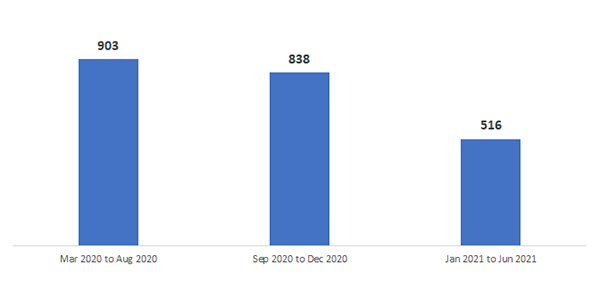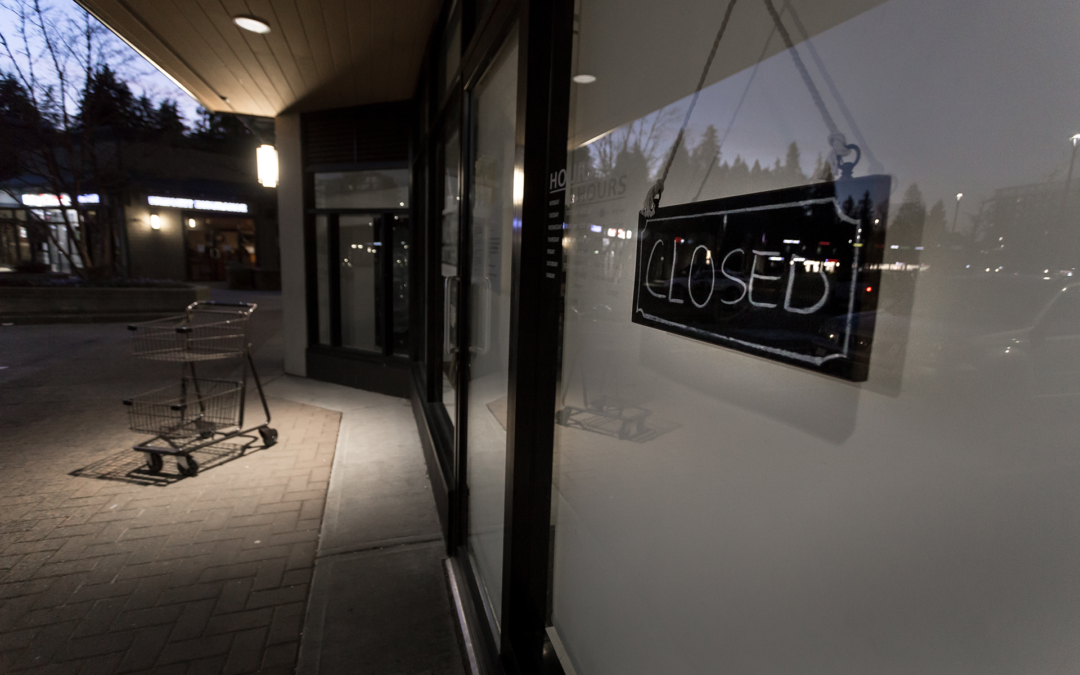More than 11,860 business locations in the East Bay have momentarily or permanently discontinued business activities between March 2020 and July 2021, according to an analysis of inactive business activity using data insights from business analytics company Dun & Bradstreet (D&B). In the first six months of the pandemic, over 5,400 businesses were closed, at an average rate of about 900 closures per month. The rate slightly declined in the last four months of 2020 at nearly 840 closures per month. The latest data available covering the six-month period between January through June 2021 showed a 40% reduction in the rate of closures, or 516 closures per month.
Average Monthly Business Closures, 16-Month Period

When the State of California announced its June 15 “Beyond the Blueprint,” which retired the state’s color-coded tier system and fully reopened the economy, this signaled blanket optimism about the “end” of the pandemic. But as more people went back to work and ventured out during the summer, the delta variant took hold and hospitalizations are approaching another peak, a challenge made more difficult due to stagnating vaccination rates. Many businesses and schools have reopened at full capacity despite a recent surge in COVID-19 infections, increasing community spread and risk of outbreaks. This is also very troubling for our business community, which continues to grapple with disruptions and uncertainty. The rise of the delta variant has stymied many office-based businesses on their return to work plans while consumer-facing businesses are facing setbacks yet again with customer/workforce volatility and overall business continuity challenges.
With cases and hospitalizations surging, public health guidelines are evolving again. We are seeing Bay Area counties take different approaches to vaccine mandates and vaccine verification for certain activities. As California lawmakers contemplate new statewide public health requirements, it is crucial that business impacts be taken seriously. Clear guidelines and resources are needed to keep businesses open and operating safely.
In a recently released briefing of a small business survey by Small Business Majority, a small business advocacy and research organization, 61% of businesses surveyed support a state mandate requiring certain public-facing businesses like restaurants, theaters and gyms to require customers to provide proof of vaccination and/or recent negative COVID-19 test and 59% would also support a state law requiring businesses to mandate vaccinations and/or weekly testing for employees. This survey reveals that California small businesses are supportive of both measures, and many have already implemented vaccine requirements on their own. The survey results point to the need for public officials to take judicious steps to keep the pandemic under control and boost consumer confidence. Businesses need more certainty, and “a statewide vaccination and testing policy can do just that.”
For a full view of the data, including business closures by location, please visit our Business Impacts page.
About Dun and Bradstreet Data: To gather closure data, D&B examined a variety of financial information and data signals, including payment transactions activity, trade and shipping data, and leasing information. It is important to note this data includes many office-based businesses that shifted to telework and underreports minority-owned and immigrant businesses, many of which are not traditionally banked.

